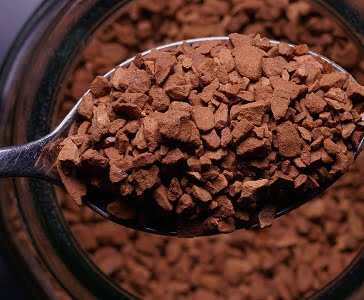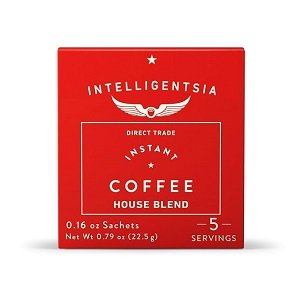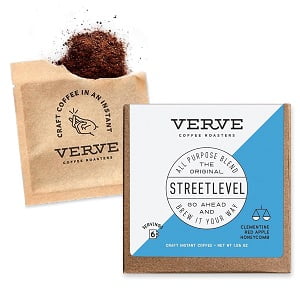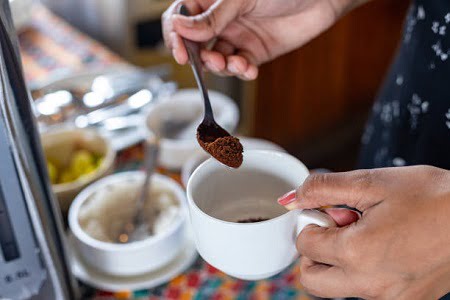Instant coffee is the underdog of the coffee world. It’s not fancy, but it gets the job done fast, cheap, and clean. When you’re running late and need a quick caffeine fix, this stuff is practically magic in a mug.
Instant coffee is a big business. In 2024, the market was worth a whopping $114.60 billion[1]. That’s a lot of quick caffeine fixes! People clearly love the convenience, even if die-hard coffee snobs might turn up their noses at it.
What is Instant Coffee?
Instant coffee is a dehydrated form of brewed coffee that is turned into crystallized powder or granules through a process of freeze-drying or spray-drying. This convenient form of coffee dissolves easily in hot water or milk to make a quick cup of coffee at any time.
Instant Coffee is also known as soluble or powdered coffee. It comes in various roasts – light, medium, or dark – just like regular coffee. The roast affects the flavor and strength, so you can pick what suits your taste buds.
Instant coffee was invented in the 18th century [2], with its earliest known creation in Britain in 1771. It became particularly popular during World War I and II as a convenient way to provide soldiers with caffeine. In the 1960s, instant coffee got a major advancement with the introduction of freeze-drying technology, which made its taste a whole lot better. Since then, it has become a global product, accounting for more than 25% [3] of coffee consumption worldwide in recent years.

How is Instant Coffee Made?
First, coffee is brewed on an industrial scale. Massive extractors use hot water to brew lots of ground coffee, making a concentrated coffee extract. This extract then undergoes one of two drying processes:
Freeze drying: In freeze-drying, the brewed coffee concentrate is first frozen at very low temperatures (-40°C or below), turning the liquid into solid ice. This frozen coffee is then placed in a vacuum chamber, where the ice is converted directly into vapor through a process called sublimation. This removes moisture while preserving the flavor and aroma of the coffee.
Spray drying: In spray-drying, the brewed coffee is sprayed as a fine mist into a chamber of hot air (typically around 200°C). As the droplets fall, the water rapidly evaporates, leaving behind dry coffee powder or granules.
Freeze-drying is generally considered superior. It better preserves the coffee’s flavor and aroma compounds, which is why high-end instant coffee brands often use this method. The resulting product tastes closer to freshly brewed coffee. Spray-drying is faster and cheaper than freeze-drying but results in a slightly inferior product in terms of taste
After drying, the coffee granules or powder are quickly packed and sealed to maintain freshness. Some manufacturers may add other ingredients like powdered milk, flavors, maltodextrin, or sugar at this stage.
Most Instant coffee is typically made with lower-quality robusta beans, which are generally more bitter and less flavorful than arabica beans. The lower cost of robusta beans makes them more common in instant coffee production.
Instant Coffee vs Ground Coffee
Ground coffee is simply roasted coffee beans that have been ground into small particles. It’s used to make brewed coffee using methods like pour-over, french press, or espresso. While Instant coffee is already brewed coffee that’s been dehydrated into soluble granules or powder.
Taste and Flavor Profile: Coffee brewed using fresh grounds has a richer and more complex flavor profile. It retains more of the coffee’s natural oils and aromatic compounds. Instant coffee, on the other hand, often has a dull, sometimes more bitter or flat taste, as much of the flavorful oils are lost during the brewing and drying process.
Shelf Life: Instant coffee has a much longer shelf life than ground coffee. Once opened, it can last for months if stored properly in an airtight container. Ground coffee, however, starts losing its flavor and aroma soon after grinding. It’s best used within a few weeks of opening for optimal taste.
Caffeine Content: On average, Instant coffee has less caffeine than brewed coffee per cup. A typical 8 oz cup of brewed coffee contains about 80-120 mg of caffeine, while the same amount of instant coffee usually contains 60-80 mg. However, this can vary depending on the type of beans used and the brewing method.
Brewing Time: Instant coffee is much faster and more convenient. It simply requires dissolving the granules in hot water or milk, making it ready to drink in seconds. Ground coffee requires a brewing process, which can take anywhere from 3-5 minutes for a drip machine to 5-10 minutes for a French press or Pour Over.
Why I don’t like Instant Coffee?
I’ve tried to love instant coffee for its convenience, but I just can’t get past the taste. It always seems stale and over-processed to me. I know they use low-quality beans and over-extract them in an attempt to pack in more flavor, and it just ends up tasting bitter and artificial.
The lack of freshness is a real deal-breaker for me. There’s nothing like the aroma and taste of freshly ground beans, and instant coffee just can’t replicate that experience. I appreciate how quick and easy it is, but for me, the trade-off in flavor just isn’t worth it.
The Pros and Cons of Instant Coffee
Pros of Instant Coffee
Convenience and Speed: Instant coffee offers unmatched convenience. It requires no brewing equipment, making it ideal for quick caffeine fixes at home, work, or on-the-go.
Best for traveling: Instant coffee is Perfect for travelers, campers, and outdoor enthusiasts. It is easy to pack and can be used to make coffee without a coffee maker anywhere hot water is available.
Rich in Antioxidants: Despite its processed nature, instant coffee retains many of coffee’s beneficial compounds [4]. It provides similar antioxidant benefits to regular brewed coffee.
Affordability: Instant coffee is generally less expensive than whole-bean or ground coffee.
Baking and Desserts: Instant coffee adds a delicious touch to baking or dessert recipes. It easily incorporates into batters and frostings, adding rich coffee flavor without excess liquid.
Cons of Instant Coffee
Bad taste: As discussed earlier, Instant coffee often has a weaker, more bitter flavor compared to freshly brewed coffee.
Less Caffeine: Instant coffee contains less caffeine. This can be a drawback for those seeking a stronger caffeine boost from their cup.
Health Considerations: Instant coffee typically contains higher levels of acrylamide, a potentially harmful compound formed during processing. Some brands also add preservatives to extend shelf life, which is generally safe for consumption but may be a concern for some
What are the Best Instant Coffee Brands
Many top coffee companies, including Nescafe, Starbucks, Folgers, and Cafe Bustelo, offer instant coffee options. After trying most of them, I’ve found a few standout brands that I consistently choose while traveling.
1- Intelligentsia Instant Coffee House Blend
Intelligentsia Instant Coffee House Blend delivers a well-balanced and sweet taste with bright notes of caramel, brown sugar, and pear. It’s smooth, easy to drink, and stands out for its clean finish compared to most instant coffee options.
Personally, I love how this instant coffee retains its fruity, rich flavor, even if it’s a bit pricier.

2- Verve, Streetlevel Blend
Verve’s Streetlevel Blend is a medium roast that delivers a rich, chocolatey aroma with a balanced mix of strong dark roast flavors and a hint of acidity.
It has a fruity brightness with notes of brown sugar and tangerine, creating a well-rounded and nuanced cup of coffee. I’m impressed by how well it captures the complexity of fresh brew.

How to make the Best Instant Coffee
While instant coffee can never taste as good as real brewed coffee here are some of my exclusive tips to make it decent and drinkable
1- Choose quality instant coffee: Look for freeze-dried, Fair Trade, and organic options.
2- Use filtered water: Always use fresh, filtered water to make instant coffee, and heat it to 190 degrees. Don’t boil it. Tap water can add undesirable flavors, while boiling water can make your coffee taste bitter or burnt. Aim for a temperature just below boiling.
3- Measure coffee carefully: Use 1-2 teaspoons for an 8 oz serving of coffee. Don’t put too much coffee into your cup it will make the taste bitter.
4- Dissolve in Cold water: Add a small amount of cold water to the coffee granules first and mix it vigorously to form a paste. This helps avoid the chalky texture and makes the flavor better.
5- Add the Hot Water: Pour hot water over the dissolved coffee paste and stir well. Add a splash of milk for creaminess, a pinch of salt to smooth bitterness, or spices like cinnamon or cardamom for added flavor.

Also Read:
- Espresso Powder vs Instant Coffee
- What is Mushroom Coffee
- What is Bulletproof Coffee
- How to Store Coffee Beans
- What is Decaf Coffee
- What is Nitro Cold Brew Coffee
FAQs
Is Instant Coffee healthy?
Instant coffee contains higher levels of acrylamide compared to freshly brewed coffee, with approximately twice the amount [5]. Acrylamide is a compound that can potentially damage the nervous system and has been linked to cancer in high doses. However, the levels of acrylamide found in coffee are still far below the amounts considered harmful to human health [6].
Can instant coffee expire?
No, instant coffee doesn’t expire in the sense of becoming unsafe to consume. However, it does lose its flavor and aroma over time. For the best taste, it’s recommended to use it within 6 months of opening. Instant coffee can become clumpy or hard if not stored properly in an airtight container, especially in humid environments.
Does instant coffee dissolve in cold water?
Yes, instant coffee does dissolve in cold water. In fact, the better way to make instant coffee is to first dissolve it in a small amount of cold water and add hot water over it. This technique makes a smoother cup of coffee without any chalky texture.
Sources
- https://www.statista.com/outlook/cmo/hot-drinks/coffee/instant-coffee/worldwide
- https://scribe.usc.edu/the-history-of-instant-coffee
- https://www.cnbc.com/video/2024/02/14/why-nescaf-instant-coffee-sales-are-surging.html
- https://pubmed.ncbi.nlm.nih.gov/25014672
- https://www.medicalnewstoday.com/articles/325295
- https://www.healthline.com/nutrition/acrylamide-in-coffee



